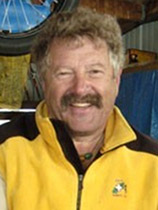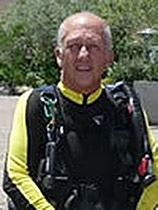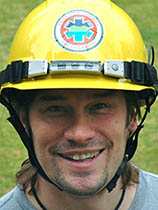Along with previous recipients Carl Weil, MFAWM, and Loren Greenway, PhD, MFAWM, FCCP, the WMS is proud to announce Seth C. Hawkins, MD, MFAWM as the latest member to earn the title of Master Fellow of the Academy of Wilderness Medicine. Along with being the only three recipients of the title so far, these three represent the first physician, PhD, and EMT to earn the title.

Weil has been teaching wilderness medicine since 1967 at Colorado State University. Under the advisement of David D. Fitzpatrick, MD, FAWM, FAAFP, and Roger Wood, MEd, PA-C, FAWM, Weil completed his Masters Fellow in 2012. As the Director of Wilderness Medicine Outfitters, he has a passion for teaching wilderness medicine and has taught 11 different wilderness medicine programs. He encourages all of his staff at WMO to receive their Fellow designations. Weil completed his program in the field of anaphylaxis, specifically in identification and treatment in austere environments.

Greenway completed his Masters Fellow under the advisement of Eric Johnson, MD, in the field of diving and hyperbaric medicine, specifically in dive accident risk assessment, prevention, and treatment. Greenway currently serves as CEO of the WMS and the director of the FAWM program. After graduating as a respiratory therapist from Mt. San Antonio College in 1977, Greenway received a Bachelor of Science in Business Administration the University of Redlands, Cali., in 1982. While serving as Administrative Director of the Pulmonary/Critical Division at LDS Hospital in Salt Lake City, Utah, he directed 40 Investigator, Government, and Pharma funded research trials.

Hawkins, who serves as Executive Editor of Wilderness Medicine Magazine, completed his Masters Fellow program in the field of Wilderness EMS under the advisement of Will Smith, MD, Paramedic, FAWM. While his degree specifically focused on the operation and medical direction of WEMS systems, Hawkins is the Executive Director of the Appalachian Center for Wilderness Medicine and the course director of the Carolina Wilderness EMS Externship. Hawkins co-founded and continues to teach the Wilderness EMS Medical Director Course, and serves as medical director for Landmark Learning and the Burke EMS Special Operations team. He also serves as the Vice Chair of the WEMS Committee of the National Association of EMS Physicians.
The Masters Fellow degree is an advanced, post-fellow certification that was created to denote individuals who have excelled in a specific sub-discipline within the scope of Wilderness Medicine. Only Fellows of the Academy of Wilderness Medicine (FAWM) may complete the program. Offered solely by the WMS, the Academy is a modular system of adult education that organizes the broad range of information in the discipline of Wilderness Medicine. The curriculum is designed to serve all Society educational activities through program design, curriculum review, lesson and topic materials, and outcomes assessment products.
To earn the Master Fellowship designation, a candidate must have:
- Been designated FAWM
- Been a Fellow in good standing for two years
- Provided the FAWM Oversight Committee a letter of intent
- Become a life member of the WMS
- Complete the Masters Fellow program within a five-year period
It should also be noted that a candidate cannot start the Masters Fellow program of study until the candidate receives an acceptance letter into the program from the Academy of Wilderness Medicine (AWM).
The degree program is divided into three parts: candidate education, scholarly activity, and experiential activity. For candidate education, the candidate is asked to select an area of concentration, which can be (but isn't limited to) one of the 14 sub-disciplines. The candidates are asked to complete a scholarly activity, which can be in the form of a formal lecture or forum, or in the form of a manuscript fit for publication. For experiential activity, it is expected that the candidate has excellent hands-on wilderness medicine skills. To demonstrate these skills, candidates would be expected to assist with the preconference workshops such as WALS and AWLS. This requirement may also be met by leading WMS-sponsored experiential trips.
Because the degree is primarily a program of independent study, the use of an advisor is required to ensure that the candidate is achieving his/her milestones. Advisors should be experts in their own fields as well as renowned wilderness medicine faculty members (any of the WMS faculty may serve as a Fellow advisor). All advisors must have their resume submitted to the AWM, and must be approved and registered as an advisor by the AWM.
The FAWM and MFAWM programs are among the greatest benefits of becoming a member of the WMS. For more information on these programs, please take a look at the WMS website.